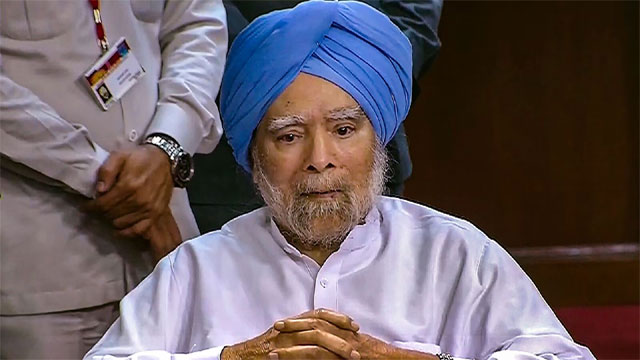By John Singarayar
Mumbai, April 3, 2024: “History will be kinder to me than the media,” were the final remarks of Manmohan Singh before he resigned as India’s prime minister, following the BJP’s victory in 2014.
On April 3 this year, he resigned from the Rajya Sabha after 33 years of service, which included two terms as the prime minister of India. He is an eminent statesman and economist.
As we reflect on his legacy, we examine the myriad ways he has impacted modern-day India, tracking his rise from scholastic achievement to political prominence and examining the enduring impacts of his leadership and policies on the nation’s socioeconomic landscape.
Manmohan Singh was born in Gah, British India (now in Pakistan) on September 26, 1932. His early years were characterized by scholastic achievement and a strong dedication to public service. He started his academic career at Punjab University, where he graduated with a bachelor’s and master’s degree in economics, setting the groundwork for his ascent to prominence in the field of economics.
His academic accomplishments and brilliance inspired him to continue his education overseas, where he eventually earned a doctorate in economics from the University of Oxford.
After returning to India, Singh began a successful academic career teaching economics at esteemed colleges and universities like Punjab University, Delhi School of Economics, and University of Delhi. His academic endeavours brought him recognition on a global scale, solidifying his position as a preeminent expert in the subject of economics.
When Singh was named Economic Advisor to the Ministry of Foreign Trade in the 1970s, he made his first steps into public service and set in motion a series of governmental positions that would influence India’s economic development for many years to come. His wise policymaking and unwavering dedication to financial stability during his stint as the Governor of the Reserve Bank of India from 1982 to 1985 set the stage for his later involvement in directing India’s economic policies.
The appointment of Singh as India’s Finance Minister in 1991 was a turning point that would determine his legacy and change the country’s economic environment. In response to an impending budgetary crisis and the pressing need for economic changes, he launched a daring liberalization, privatization, and globalization agenda that cleared the path for India’s entry into the world market and eliminated decades of bureaucratic red tape.
Singh’s historic changes as Finance Minister ushered in a new phase of India’s economic development and prosperity by accelerating the country’s industrialization, foreign investment, and technological improvement. India’s economic recovery was largely credited to his innovative leadership during this time, which made the country a major player on the international scene and turned it into a worldwide powerhouse.
Singh became the nation’s most senior leader in 2004 when he was appointed the Prime Minister of India. He held this position for ten years, making him one of the most enduring leaders in Indian history. His leadership was marked by an unwavering dedication to social justice, inclusive growth, and diplomatic engagement as he worked to address the many issues confronting a country that was changing quickly.
In his role as prime minister, Singh promoted a progressive agenda that put the needs of neglected areas and underprivileged populations first. This agenda was centered on infrastructure modernization, rural development, and poverty reduction. Numerous large-scale initiatives were carried out under his administration, including the Mahatma Gandhi National Rural Employment Guarantee Act (MGNREGA), which offered financial stability and guaranteed employment to millions of rural households.
Along with his accomplishments at home, Singh’s time as prime minister was distinguished by an assertive foreign policy style that intended to raise India’s profile internationally and promote collaboration amongst nations. Along with pushing for more multilateralism and cooperation on urgent global issues like counterterrorism and climate change, he was instrumental in fortifying India’s strategic alliances with important allies and neighbors.
Singh led with integrity, humility, and a strong commitment to preserving secularism and democracy during his two tenure as prime minister, even in the face of strong resistance from the political class and other major obstacles. People of all political persuasions respected and admired him for his ability to handle difficult political situations with elegance and grace, which cemented his position as a statesman of unmatched grandeur.
As Singh leaves the Rajya Sabha, his legacy lives on as a source of inspiration and hope for upcoming leaders and legislators. His steadfast commitment to public service, together with his astute leadership and intellectual prowess, have irrevocably shaped contemporary India’s course and defined its goals on the international scene.
To sum up, the retirement of Singh from the Rajya Sabha signifies the end of an incredible journey filled with unmatched accomplishments and enduring services to the country.
As we negotiate the opportunities and difficulties of the 21st century, his legacy as a leader for modern India will continue to inspire and guide us, paving the way for a more prosperous, inclusive, and equitable future for everyone.
As the Congress Party says, “He will remain a Hero.”










